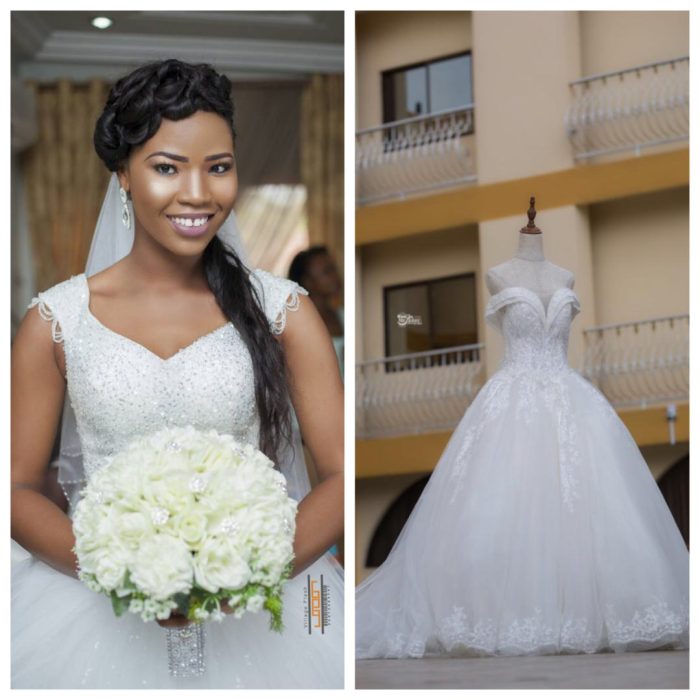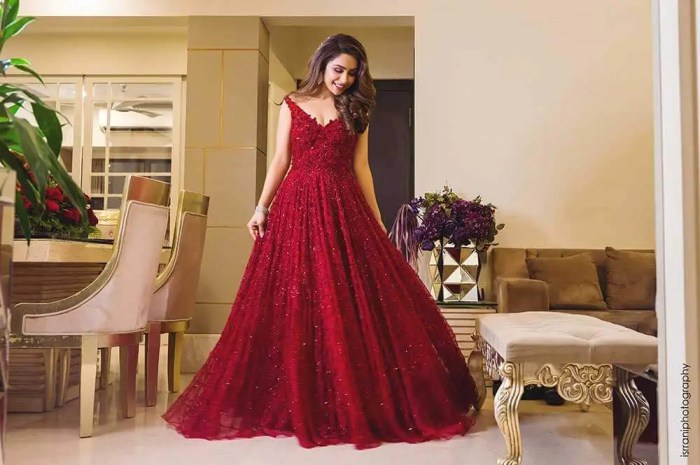Styles of Formal Wedding Party Dresses
Formal wedding party dresses – Choosing the right formal wedding party dress involves understanding various design elements that contribute to the overall look and feel. This section explores the key styles, necklines, sleeves, and embellishments to consider.
Dress Silhouettes
The silhouette of a dress significantly impacts its appearance and how it flatters different body types. Consider these options:
| Silhouette | Description | Suitable Body Types | Example Fabrics |
|---|---|---|---|
| A-line | Fitted at the shoulders and gradually widens towards the hem, creating a flattering A-shape. | Most body types | Silk chiffon, satin, lace |
| Mermaid | Fitted from the shoulders to the knees, then flares out dramatically, resembling a mermaid’s tail. | Hourglass, athletic | Silk crepe, satin, taffeta |
| Empire Waist | Fitted just below the bust and flows loosely to the floor, emphasizing the upper body. | Most body types, especially those who want to highlight their upper body | Silk charmeuse, chiffon, georgette |
| Ballgown | Fitted bodice with a full, voluminous skirt. | Most body types, particularly those wanting a princess-like look. | Tulle, organza, satin |
Neckline Styles, Formal wedding party dresses
The neckline plays a crucial role in shaping the overall look. Popular choices include:
- Sweetheart: A curved neckline that resembles the shape of a heart.
- Halter: A neckline that ties or fastens behind the neck, leaving the shoulders and back exposed.
- V-neck: A neckline that forms a V-shape, elongating the torso.
- Off-the-shoulder: A neckline that exposes the shoulders and upper arms.
- High neck: A neckline that covers the majority of the neck and upper chest.
Sleeve Lengths and Styles

Source: ghanaweddingmarket.com
Sleeve styles add another layer of design and can influence the formality and overall aesthetic.
| Sleeve Style | Description |
|---|---|
| Sleeveless | No sleeves, suitable for warmer weather or a more modern look. |
| Short Sleeves | Sleeves that end above the elbow, offering a balance between coverage and style. |
| Long Sleeves | Sleeves that extend to the wrist, adding elegance and sophistication, particularly for colder seasons. |
| Cap Sleeves | Short, fitted sleeves that cover only the shoulders. |
Embellishments
Embellishments can significantly enhance the visual appeal of a formal wedding party dress. The choice of embellishment can dramatically change the overall look and feel.
- Beading: Adds sparkle and texture, creating a glamorous effect. Intricate beading can elevate a simple dress design.
- Lace: Adds romanticism and delicacy. Lace can range from delicate floral patterns to bold geometric designs.
- Sequins: Creates a shimmering effect, perfect for a more glamorous or celebratory occasion. Sequin embellishments can be subtle or extravagant.
- Embroidery: Adds intricate detail and visual interest, often incorporating threads of different colors and textures.
Color and Fabric Choices for Formal Wedding Party Dresses

Source: shaadiwish.com
The color and fabric of a dress significantly impact its overall look and feel, influencing its suitability for different seasons, wedding themes, and personal styles.
Popular Color Palettes
Color choices often depend on the season and the wedding’s overall theme.
| Color | Season | Wedding Theme |
|---|---|---|
| Pastels (e.g., blush pink, lavender) | Spring, Summer | Romantic, garden, rustic |
| Jewel tones (e.g., emerald green, sapphire blue) | Autumn, Winter | Formal, elegant, vintage |
| Navy, Burgundy | Autumn, Winter | Classic, sophisticated |
| Ivory, Champagne | Any Season | Classic, Elegant |
Fabric Comparison
Different fabrics offer unique qualities in terms of drape, comfort, and maintenance.
- Silk: Luxurious, drapes beautifully, but requires careful cleaning.
- Satin: Smooth, shiny, and elegant, but can wrinkle easily.
- Chiffon: Lightweight, sheer, and flowing, but can be delicate.
- Lace: Delicate, romantic, and adds texture, but can be less forgiving on certain body types.
- Taffeta: Crisp, structured, and holds its shape well, but can be less comfortable in warm weather.
Fabric Advantages and Disadvantages
| Fabric | Advantages | Disadvantages |
|---|---|---|
| Silk | Luxurious drape, breathable | Expensive, requires dry cleaning |
| Satin | Elegant sheen, smooth texture | Wrinkles easily, can be less breathable |
| Chiffon | Lightweight, flowing | Delicate, can be see-through |
| Lace | Romantic, textured | Can be itchy, requires careful handling |
Fabric’s Influence on Overall Look
Fabric choice significantly impacts the overall aesthetic. For instance, a silk gown exudes luxury and elegance, while a chiffon dress conveys a sense of lightness and airiness. A structured taffeta dress creates a more formal and defined silhouette compared to a flowing silk crepe gown.
Accessorizing Formal Wedding Party Dresses
Accessories play a vital role in completing the look of a formal wedding party dress. Careful selection enhances the overall aesthetic and complements the dress and the wedding’s theme.
Accessory Suggestions
The right accessories can elevate a dress and personalize the overall look. Consider these suggestions:
- Statement jewelry: A bold necklace or earrings can draw attention to the neckline and add a touch of glamour.
- Delicate jewelry: Subtle earrings and a bracelet can complement a more understated dress.
- Matching clutch: A small, elegant clutch adds a touch of sophistication.
- Elegant shoes: Heels or elegant flats should complement the dress and be comfortable for dancing.
- Shawl or wrap: A stylish shawl or wrap can add warmth and elegance, especially for evening weddings or cooler weather.
Complementary Accessories
| Accessory | Description | Matching Dress Style | Example |
|---|---|---|---|
| Statement Necklace | Bold and eye-catching | Simple neckline, strapless | A large pearl necklace with a strapless gown |
| Delicate Earrings | Subtle and elegant | Intricate neckline, detailed bodice | Diamond studs with a lace dress |
| Clutch | Small handbag | Any dress style | Sequin clutch with a sequin dress |
| Heels | Elevates the look, adds height | Most dress styles | Silver heels with a silver dress |
Hair and Makeup
Hair and makeup choices should complement the dress and the overall wedding aesthetic. A sleek updo might suit a sleek, modern gown, while loose curls might complement a romantic, flowing dress. Makeup should be sophisticated and enhance natural features, avoiding anything too heavy or distracting.
Venue and Time Considerations
The wedding venue and time of day influence accessory choices. For an outdoor daytime wedding, lighter accessories and a more natural makeup look might be appropriate. An evening indoor wedding might call for more glamorous accessories and a more polished makeup look. Consider the formality of the venue; a grand ballroom might warrant more elaborate accessories than a casual garden setting.
Finding and Purchasing Formal Wedding Party Dresses
Finding the perfect formal wedding party dress requires careful planning and consideration of various factors, from budget to fit and alterations.
Resources for Finding Dresses
There are numerous resources available to help you find your perfect dress:
- Bridal boutiques: Offer a wide selection of dresses and personalized service.
- Department stores: Provide a range of styles and price points.
- Online retailers: Offer convenience and a vast selection.
- Specialty boutiques: Cater to specific styles or designers.
Budgeting for a Wedding Party Dress
Determining a budget is crucial. Consider the dress’s cost, alterations, and accessories. Factors influencing price include fabric, embellishments, designer, and retailer.
Finding the Perfect Fit and Alterations
Getting the perfect fit is essential for comfort and appearance. Follow these steps:
- Choose a dress that generally fits well, even if it requires alterations.
- Consult with a seamstress or tailor for alterations.
- Have the dress altered well in advance of the wedding.
- Try the dress on again after alterations to ensure a perfect fit.
Taking Accurate Measurements
Accurate measurements are crucial for custom-made or altered dresses. Follow these steps:
- Bust: Measure around the fullest part of your bust, keeping the tape measure level.
- Waist: Measure around your natural waistline, the narrowest part of your torso.
- Hips: Measure around the fullest part of your hips, keeping the tape measure level.
- Hollow to hem: Measure from the hollow of your throat to the desired length of the dress.
- Shoulder to shoulder: Measure across your back from one shoulder bone to the other.
- Shoulder to bust: Measure from your shoulder bone to the fullest part of your bust.
- Armhole circumference: Measure around the armhole, keeping the tape measure snug.
Commonly Asked Questions
What is the difference between a formal and semi-formal wedding party dress?
Formal dresses typically feature luxurious fabrics, intricate embellishments, and floor-length hemlines. Semi-formal dresses allow for more flexibility, potentially including tea-length or knee-length styles and simpler designs.
How far in advance should I start looking for a formal wedding party dress?
Formal wedding party dresses often involve elegant fabrics and sophisticated silhouettes. However, the level of formality can depend on the overall wedding style; for smaller, more intimate gatherings, the attire might be slightly less structured. If you’re attending a small wedding, finding the perfect dress is easier than you might think – check out these options for dresses for a small wedding to find inspiration.
Ultimately, the best formal wedding party dress will complement both the event and your personal style.
Ideally, begin your search at least 3-6 months before the wedding to allow ample time for alterations and potential shipping delays.
What should I do if my dress needs alterations?
Schedule a fitting with a professional seamstress or tailor as soon as possible after purchasing the dress. Allow sufficient time for adjustments before the wedding date.
Can I wear a formal wedding party dress to other events?
Depending on the style and embellishments, many formal wedding party dresses can be repurposed for other formal occasions, such as galas or black-tie events.
